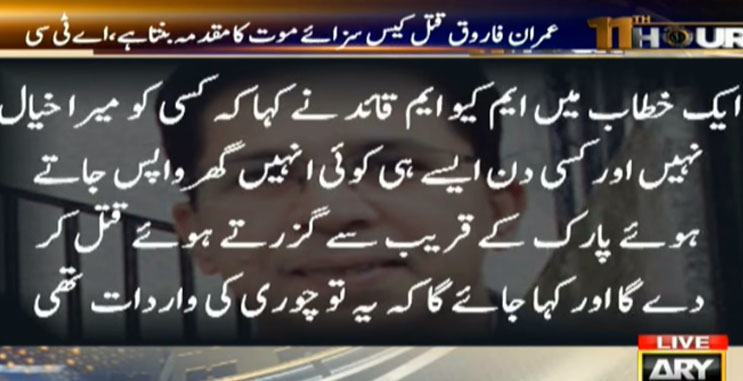
ISLAMABAD: The Anti-Terrorism Court (ATC) in Islamabad has sentenced three accused to life imprisonment in the decade-old murder case of Muttahida Qaumi Movement (MQM) leader Dr Imran Farooq.
The three accused found guilty in the case included Syed Mohsin Ali, Moazzam Ali, and Khalid Shamim. They were also imposed a fine of Rs1.2 million each.
The verdict announced by ATC judge Shahrukh Arjumand noted that the assassination of Dr Imran Farooq was the result of a conspiracy hatched in the United Kingdom (UK) and Pakistan by Altaf Hussain, the head of the MQM. Muhammad Anwar and Iftikhar Hussain, senior member of the MQM, were also involved in the murder plot, it said.
As per the plot, Khalid Shamim and Moazzam Ali facilitated and sent Muhammad Kashif and Syed Mohsin Ali to the UK for murdering Dr Farooq who was killed in Green Lane, Edgeware area of London on September 16, 2010.
The murder case was instituted in 2016 and two years later, Altaf Hussain was declared a fugitive. He was eventually declared proclaimed offender over no-show by the court that issued his arrest warrants after the publication of his summons in two foreign English newspapers.
The court also issued directives for blocking Altaf Hussain’s passport and cancellation of his CNIC.
Detective Chief Inspector of the London Metropolitan Police Service (MPS) Staurt Greenaway who was probing the murder case came to Pakistan and recorded his statement before the ATC. 15 other UK-based witnesses also recorded their statements via video link.
A prosecutor representing the Government of Pakistan stated before the court that Mohsin Ali and Kashif were sent to the UK to silence the voice of Dr Farooq who was emerging as a potential threat to Altaf Hussain.
Moazzam Ali and Khalid Shamim facilitated Mohsin Ali and Kashif in getting admission to an educational institution of London and then their subsequent travel. Mohsin and Kashif after assassinating Dr Farooq flew to Sri Lanka where their facilitator Khalid Shamim was already waiting for them.
The verdict noted that the case was of historical significance since documentary evidence and articles collected by London police were produced during the trial after an agreement of Mutual Legal Assistance was reached between the two countries.
An ordinance was promulgated to amend Pakistan Penal Code 1860 whereby, in cases where evidence is shared by a foreign country death penalty cannot be given.
The ordinance was, in fact, an assurance extended to the UK government by the Government of Pakistan that the accused will not be awarded death penalty when found guilty.
The verdict said that the case in hand is a fit one for awarding death penalty, however, as an ordinance has been promulgated to amend Pakistan Penal Code 1860 whereby, in the cases where evidence is shared by a foreign country death penalty cannot be given.
Mohsin Ali’s lawyer denied the charges saying his client had gone to London to acquire higher education and that he has nothing to do with the crime. He claimed that the slain MQM leader had a criminal background and therefore, had many foes as Mohsin was implicated in the case to distract attention from them, he added.
Khalid Shamim in his confessional statement said he was a long-time supporter of the MQM. He stated that Dr Farooq’s party membership was suspended because he wanted to become a top leader of the party after Altaf Hussain.
He said: “One day, MQM chief Altaf Hussain in his telephonic address said that no one cares about me [Altaf Hussain] as someday someone would kill me near park when I will be returning home and it would be billed as robbery.”
Khalid Shamim said he telephoned Muhammad Anwar after listening to Altaf Hussain’s address, adding that Anwar told him that there were clues and instructions for him in the address.
These instructions were clear that Dr Farooq was creating his own faction within the party and it is necessary to stop him. Afterward, a meeting took place at Nine Zero, the then headquarters of MQM, for the purpose and the two men were sent to London and were given 25,000 pounds each for the task.
The court ruled that confessions of the accused persons established the fact that Dr Farooq feared for his safety and had identified the top leadership of the MQM that were likely to exterminate him.
The post Here’s all you need to know about Imran Farooq murder case appeared first on ARY NEWS.
from ARY NEWS https://ift.tt/2Yfn3Mx
Comments
Post a Comment